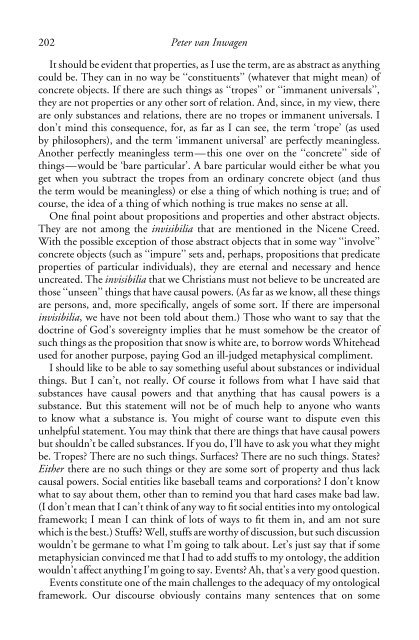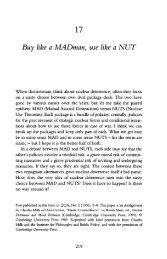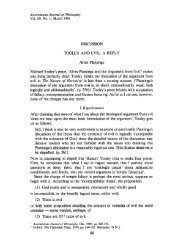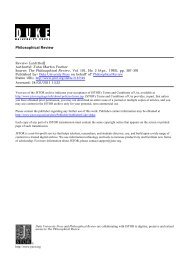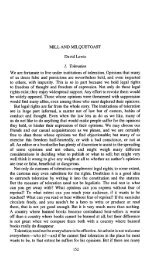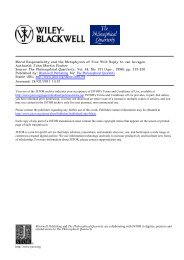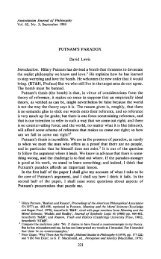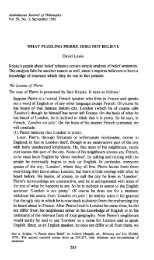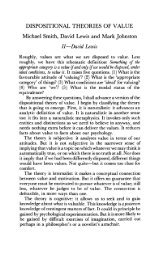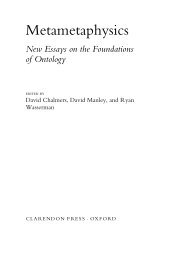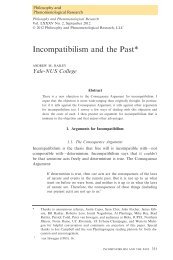A Materialist Ontology of the Human Person - Andrew M. Bailey
A Materialist Ontology of the Human Person - Andrew M. Bailey
A Materialist Ontology of the Human Person - Andrew M. Bailey
You also want an ePaper? Increase the reach of your titles
YUMPU automatically turns print PDFs into web optimized ePapers that Google loves.
202 Peter van Inwagen<br />
It should be evident that properties, as I use <strong>the</strong> term, are as abstract as anything<br />
could be. They can in no way be ‘‘constituents’’ (whatever that might mean) <strong>of</strong><br />
concrete objects. If <strong>the</strong>re are such things as ‘‘tropes’’ or ‘‘immanent universals’’,<br />
<strong>the</strong>y are not properties or any o<strong>the</strong>r sort <strong>of</strong> relation. And, since, in my view, <strong>the</strong>re<br />
are only substances and relations, <strong>the</strong>re are no tropes or immanent universals. I<br />
don’t mind this consequence, for, as far as I can see, <strong>the</strong> term ‘trope’ (as used<br />
by philosophers), and <strong>the</strong> term ‘immanent universal’ are perfectly meaningless.<br />
Ano<strong>the</strong>r perfectly meaningless term—this one over on <strong>the</strong> ‘‘concrete’’ side <strong>of</strong><br />
things—would be ‘bare particular’. A bare particular would ei<strong>the</strong>r be what you<br />
get when you subtract <strong>the</strong> tropes from an ordinary concrete object (and thus<br />
<strong>the</strong> term would be meaningless) or else a thing <strong>of</strong> which nothing is true; and <strong>of</strong><br />
course, <strong>the</strong> idea <strong>of</strong> a thing <strong>of</strong> which nothing is true makes no sense at all.<br />
One final point about propositions and properties and o<strong>the</strong>r abstract objects.<br />
They are not among <strong>the</strong> invisibilia that are mentioned in <strong>the</strong> Nicene Creed.<br />
With <strong>the</strong> possible exception <strong>of</strong> those abstract objects that in some way ‘‘involve’’<br />
concrete objects (such as ‘‘impure’’ sets and, perhaps, propositions that predicate<br />
properties <strong>of</strong> particular individuals), <strong>the</strong>y are eternal and necessary and hence<br />
uncreated. The invisibilia that we Christians must not believe to be uncreated are<br />
those ‘‘unseen’’ things that have causal powers. (As far as we know, all <strong>the</strong>se things<br />
are persons, and, more specifically, angels <strong>of</strong> some sort. If <strong>the</strong>re are impersonal<br />
invisibilia, we have not been told about <strong>the</strong>m.) Those who want to say that <strong>the</strong><br />
doctrine <strong>of</strong> God’s sovereignty implies that he must somehow be <strong>the</strong> creator <strong>of</strong><br />
such things as <strong>the</strong> proposition that snow is white are, to borrow words Whitehead<br />
used for ano<strong>the</strong>r purpose, paying God an ill-judged metaphysical compliment.<br />
I should like to be able to say something useful about substances or individual<br />
things. But I can’t, not really. Of course it follows from what I have said that<br />
substances have causal powers and that anything that has causal powers is a<br />
substance. But this statement will not be <strong>of</strong> much help to anyone who wants<br />
to know what a substance is. You might <strong>of</strong> course want to dispute even this<br />
unhelpful statement. You may think that <strong>the</strong>re are things that have causal powers<br />
but shouldn’t be called substances. If you do, I’ll have to ask you what <strong>the</strong>y might<br />
be. Tropes? There are no such things. Surfaces? There are no such things. States?<br />
Ei<strong>the</strong>r <strong>the</strong>re are no such things or <strong>the</strong>y are some sort <strong>of</strong> property and thus lack<br />
causal powers. Social entities like baseball teams and corporations? I don’t know<br />
what to say about <strong>the</strong>m, o<strong>the</strong>r than to remind you that hard cases make bad law.<br />
(I don’t mean that I can’t think <strong>of</strong> any way to fit social entities into my ontological<br />
framework; I mean I can think <strong>of</strong> lots <strong>of</strong> ways to fit <strong>the</strong>m in, and am not sure<br />
which is <strong>the</strong> best.) Stuffs? Well, stuffs are worthy <strong>of</strong> discussion, but such discussion<br />
wouldn’t be germane to what I’m going to talk about. Let’s just say that if some<br />
metaphysician convinced me that I had to add stuffs to my ontology, <strong>the</strong> addition<br />
wouldn’t affect anything I’m going to say. Events? Ah, that’s a very good question.<br />
Events constitute one <strong>of</strong> <strong>the</strong> main challenges to <strong>the</strong> adequacy <strong>of</strong> my ontological<br />
framework. Our discourse obviously contains many sentences that on some


